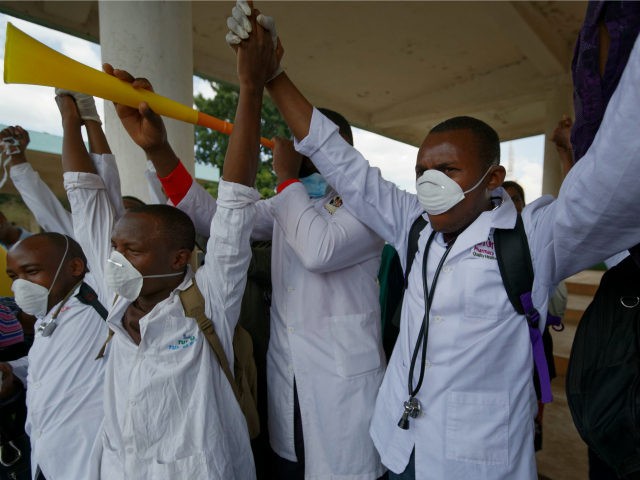A court in Nairobi, Kenya, ruled against local doctors Wednesday suing the government for importing 100 doctors from Cuba to take jobs that medical professionals in the country say rightfully belong to Kenyan citizens.
The government of President Uhuru Kenyatta made a deal with the communist Castro regime to import 100 doctors, all specialists, who would be sent in pairs to each county of Kenya. The Kenya Medical Practitioners, Pharmacists and Dentists’ Union (KMPDU) objected to the plan from the state, noting that their union had 1,000 unemployed Kenyan doctors in it who would now have 100 fewer job opportunities because the government handed those positions over to foreigners.
The Cuban government uses “medical diplomacy” – the deployment of doctors around the world, often against their will – to ensure support at the United Nations and other international venues from underdeveloped countries. It is also one of the country’s biggest revenue streams, above tourism, earning an estimated $8 billion a year for the Castros. Multiple reports citing doctors who have escaped the system call it “slavery,” where doctors are paid only meager living “stipends” to ensure they are not homeless, but must often suffer malnutrition and little pay.
Late last year, 150 Cuban doctors stationed in Brazil sued Havana in Brazilian courts to break their contracts with the Cuban government, which they claimed were illegally onerous on the doctors.
Despite the evidence of the Cuban doctor industry violating the human rights of its workers, the Kenyan judiciary ruled that the rights of Kenyans to access to these doctors overrode any concerns local doctors have of being replaced by underpaid workers.
“Statistics produced in this court by respondents are enough proof the specialists are urgently needed, especially upcountry, where Kenyan doctors have no interest,” Justice Nzioki Makau ruled. “The plaintiffs did not prove that the rights of doctors and specialists have been violated by the decision to import Cuban doctors.”
The court noted that the “upcountry” positions had been open for months without receiving job applications from Kenyan doctors.
Plaintiff Samson Misango, which Kenya’s the Standard identifies as “an assistant director of medical services and consultant surgeon,” alleged that the Kenyan government lied about the number of doctors needed throughout the country. Makau found that Misango did not prove with sufficient evidence to the court that the jobs the Cubans would do could be easily filled by Kenyan doctors, or that the unemployed Kenyan doctors had the same skills as the Cubans. He scolded the government for not consulting the medical union to find local doctors before cutting the Cuba deal, but ultimately allowed the Cuban doctors to assume their positions.
Kenyatta brokered a deal with Raúl Castro during a visit to Havana in March to bring the doctors over, without consulting the Kenyan medical union.
Kenya’s union claims that about 500 doctors in the country are unemployed of those registered with the union.
The Cubans were already in the country when the verdict came down. They could not work for a month since their arrival in June until the court ruled on the Misango suit.
The Standard lists the Cuban doctors as “nine critical care physicians, three cardiologists, five orthopaedic surgeons, three plastic and reconstructive surgeons, and five nephrologists … three urologists, one neurosurgeon, two endocrinologists and 53 family physicians.”
Politicians in the affected counties have expressed excitement at welcoming the new doctors.
“The fact that different counties are getting different specialists from Cuba is a chance to have an exchange programme so that local doctors can get vast knowledge to attend to various ailments that would instead have been treated outside the country at a huge cost,” Nakuru County Governor Lee Kinyanjui told the Standard.
Politicians have begun a campaign to ensure that Kenyan doctors cooperate with their Cuban counterparts.
“They are not getting huge perks. They are specialised doctor[s],”Health Cabinet Secretary (CS) Sicily Kariuki told doctors in remarks Wednesday, according to the Daily Nation. “I would tell you getting the private doctors at that level of specialisation is monies that would perhaps be double or three times what we are actually paying.”
Medical professionals are less enthusiastic, not just because their unemployed colleagues have lost opportunities, but because the system for distributing the Cuban specialists did not count on them to figure out where to send them.
“Specialists and more doctors are required but each county was to receive doctors according to their disease epidemic,” Dr.Davji Atellah told The Standard, noting that Nakuru, for example, did not need more family doctors.
Dauti Kahura, a columnist at the Daily Nation, predicts that Kenyan doctors will sabotage their Cuban counterparts, citing interviews with local doctors. He states that doctors have told him they will fail to give the proper tools to Cuban doctors during surgery and engage in other unethical acts because “the clinicians are miffed that the government finds it fit to pay foreign doctors exorbitantly, but will not do the same for Kenyan doctors, who toil hours on end with scarce resources and badly equipped hospitals.”
“Whichever way you look at it, the decision to invite 100 foreign doctors to ostensibly come to alleviate and therefore ameliorate a deteriorating healthcare system in the country was a horribly ill-informed idea,” Kahura concludes.

COMMENTS
Please let us know if you're having issues with commenting.